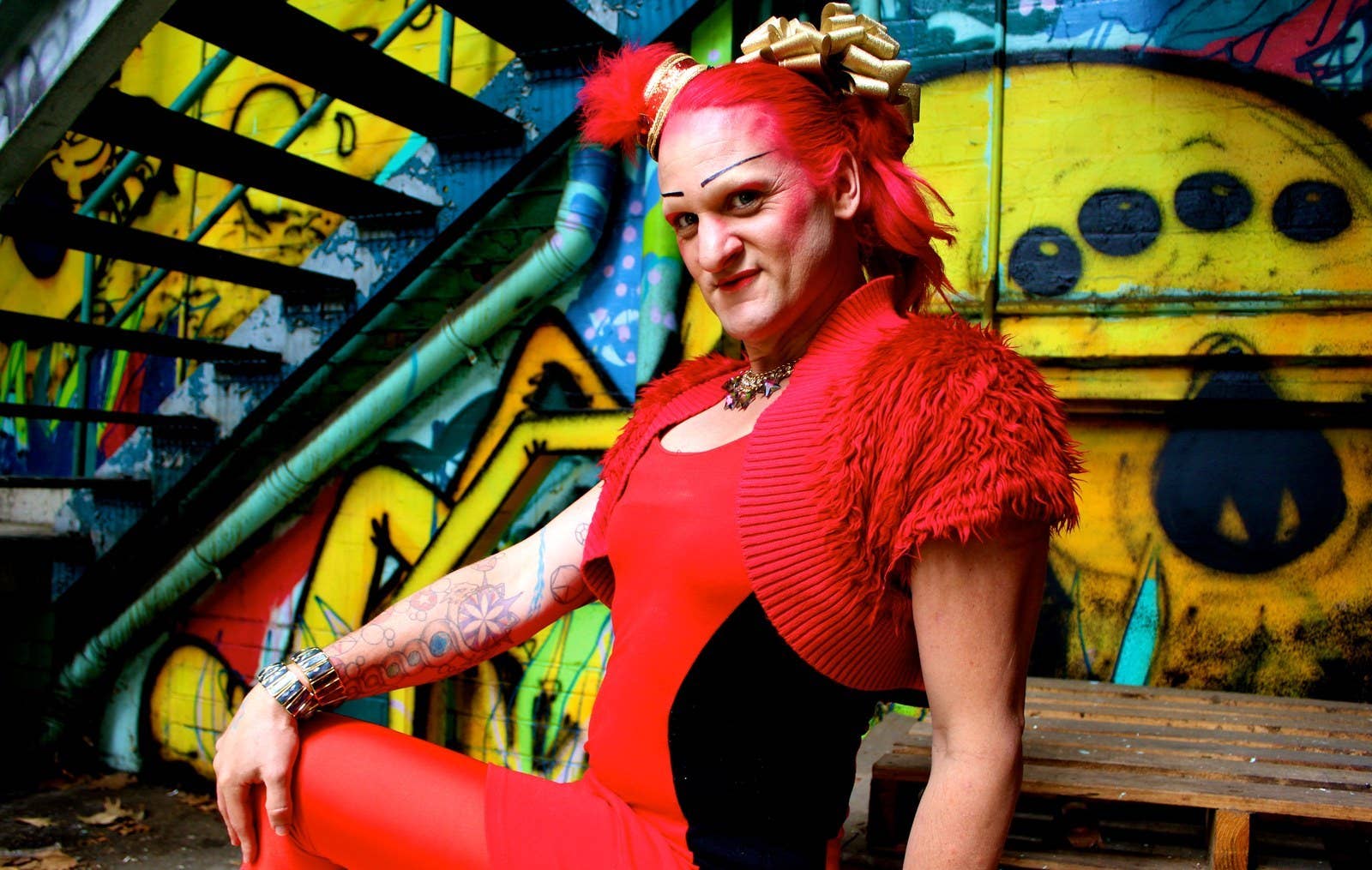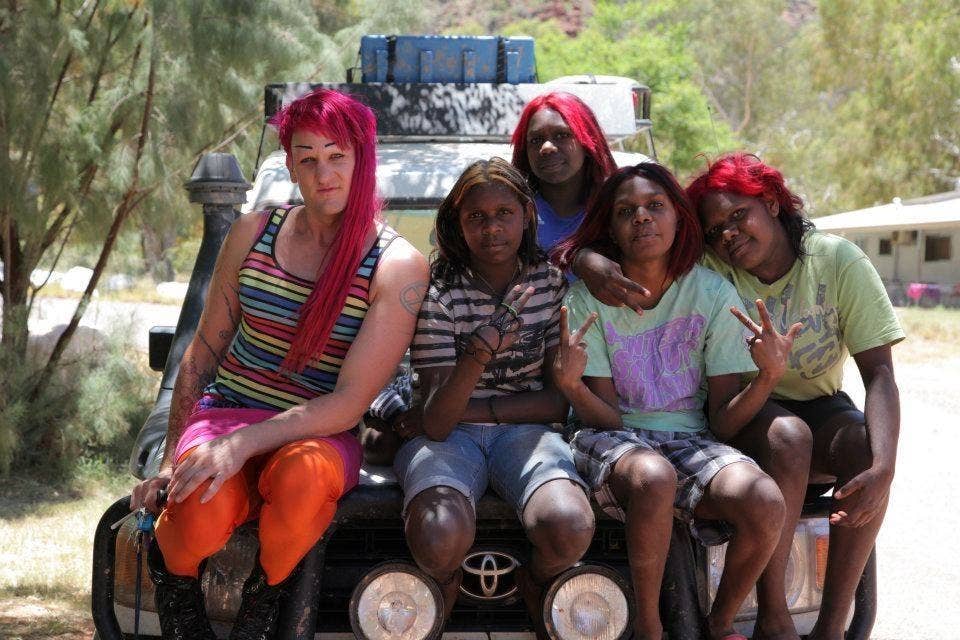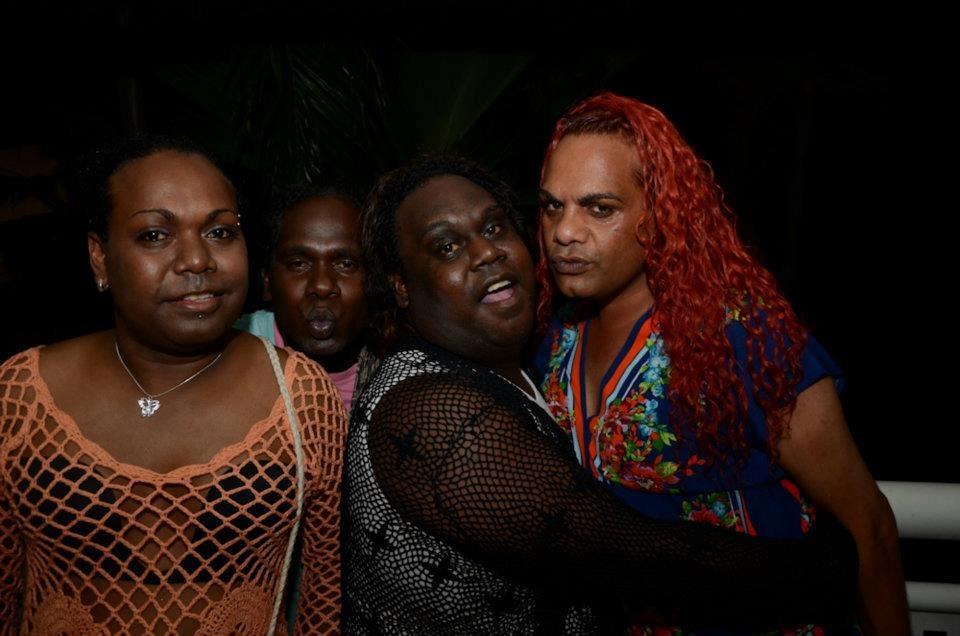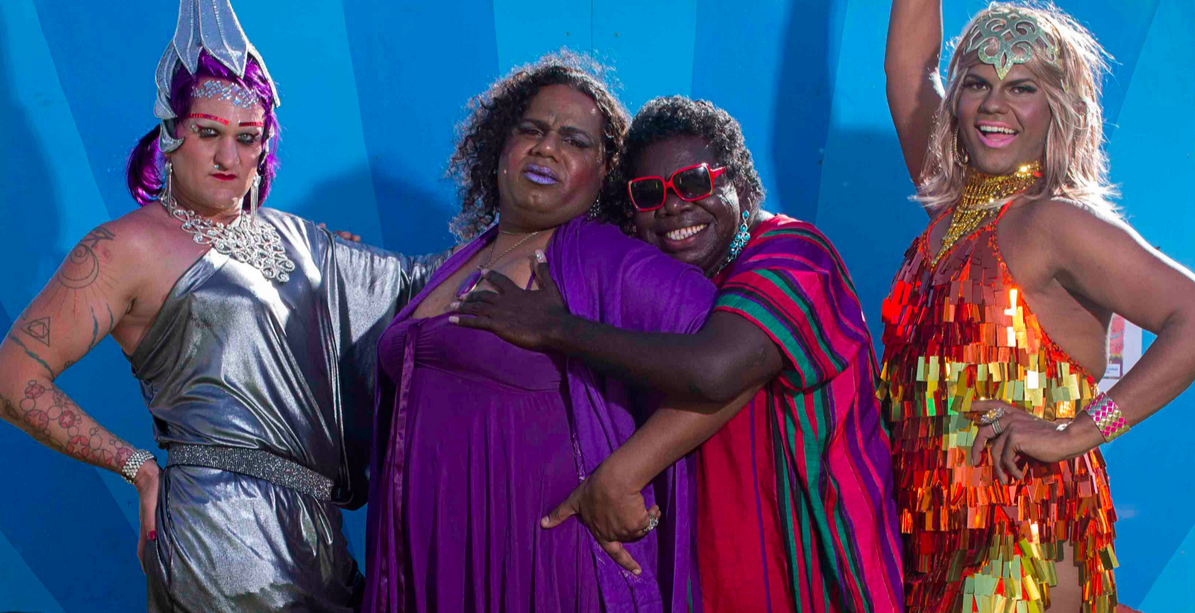
Rocking a plume of ruby red feathers on a chilly late-Autumn day, Starlady Nungari struts down the cracked pavements of inner-city Sydney in knee-high leather red boots, a blur of traffic behind her. Her ensemble so outrageously over the top that it is spectacular: rouge tights, a skin-tight minidress and a furry red bolero, topped off with a very creative wrapping of gold ribbons as a hairpiece.
Starlady takes a seat in a Surry Hills cafe, hipster central. A group of middle-aged women keep glancing over, taking in Starlady's outfit as they sip their cappuccinos.
Oblivious to the attention, Starlady is nervous about her imminent TedX Talk at the Sydney Opera House, explaining that she's worried about forgetting her speech. With a giggle, she says she's covered the cue cards in glitter, because even the smallest and most functional things can be fabulous.
One of Australia's foremost champions of transgender issues, hairdresser turned youth worker Starlady is in Sydney to speak about her youth work in the central desert.
Australia's remote centre seems an unlikely place for acceptance, but it's there amidst the lush red soil that Starlady came to peace with her gender identity and found acceptance among the remote Aboriginal communities.
"In 1996 I found myself before the Victorian Victims Compensation Tribunal seeking justice after being violently assaulted by homophobic bigots. The presiding magistrate looked me up and down, and with his head held high he proclaimed his judgement, “If Joe Blow saw you walking down the street, dressed like that, he’d say that you deserved it.” He gave me a pittance of the compensation I should have received and I walked out of our justice system absolutely devastated!" - Starlady Nungari.
Running a "renegade salon" giving young people radical hairstyles, Starlady inadvertently became a colourful beacon of hope for Aboriginal people struggling with their sexuality and identity. This was especially true for the people known as Sistergirls - transgender Aboriginal people.
"It's incredibly vital that we have more support for Sistergirls. Just in the last year we've had Sistergirls commit suicide, so the risk is really real. There is a lot of unreported self harm and suicides. There's already a lot of suicides in the Northern Territory and I know some of those young people and they weren't heterosexual, but is anyone acknowledging that that is part of the story?"
Starlady's very presence in the community opened a dialogue around transgender issues. It's a discussion rarely had in Aboriginal communities.
"There is an enormous amount of homophobia and transphobia within the Northern Territory Government. In our state's sexual health package gender diversity or the terms Sistergirl or Brotherboy (Aboriginal transgender person born female but identifying as male) aren't even mentioned, even though we have contacted these organisations saying we are willing to consult for free."
The Northern Territory Government says that it is committed to ensuring support of the Aboriginal LGBTQI community.
The Northern Territory Minister for Health John Elfernik told BuzzFeed News, "there is recognition of particular needs of the LGBTQI community in Department of Health’s programs. Within Northern Territory Government’s Suicide Prevention Strategic Action Plan the need to strengthen support for LGBTQI Community is explicit and programs to support LGBTQI youth and community are supported."
“We are keen to identify how this might best be achieved, and encourage the LGBTQI community and representative bodies to make contact with the Department of Health with proposals of service models and provision for consideration" - Northern Territory Minister for Health, John Elfernik.

The stark reality for transgender Indigenous people in remote communities is one of silent hardship. Being transgender is considered taboo in many remote Aboriginal communities, an attitude that has prevailed since Christian missionaries introduced religion into communities.
Sistergirls are often rejected by their families, many have to leave their communities to find support. Those who stay either suffer in silence or must navigate a complex cultural system that is strongly divided into clear cut gender roles.
Sistergirls often leave their homes to find help in cities, which can lead to more problems. There have been no comprehensive studies done on the Sistergirl community, but ACON Health, an organisation specialising in lesbian, gay, bisexual, transgender and intersex health, says anecdotal evidence shows that Sistergirls are more likely to participate in risky sexual behaviour, use drugs and alcohol and may be at a higher risk of committing suicide.

It's a life that Sistergirl Simone Miller knows all too well.
Simone was raised in the small Aboriginal community of Koonibba in South Australia.
Ms Miller tells BuzzFeed News that she left her community in search of support, instead she hit rock bottom.
"I moved to the city, I prostituted myself. I've done drugs, I've done a lot of things that I regret and it shouldn't be like that. No one should have to go through that just to be accepted. I am so glad that I came out on the the other side. Sadly that's not the case for most Sistergirls."
Simone's experience is one that is mirrored across the country. She overcame the odds and is now a public advocate for Sistergirl rights.
Simone moved backed to her home community and is studying to be counsellor with the goal of helping transgender people find the support they need.
"The reason I am doing this is they need more people in that field, supporting young Brotherboys and Sistergirls. I want to help rural and remote LGBTI people in their journey. Just be there for them, let them know that it's okay, this is you, love yourself, accept yourself, because you know no one's going to love yourself and accept you if you don't accept yourself."

Starlady says the situation in the Northern Territory is becoming so dire that children as young as 13, who are starting to struggle with their sexuality, are taking their own lives.
Outreach programs targeting these vulnerable young people are virtually non-existant. The Northern Territory's largest Aboriginal health service, Central Australian Aboriginal Congress (CAAC), does not have one program aimed at LGBTI issues.
One of the only organisations funded to work with the Indigenous community around sexuality and gender issues is The Northern Territory AIDS and Hepatitis Council (NTAHC). Director Kim Gates told BuzzFeed News that their Aboriginal program may be in jeopardy. Their federal funding is due to run out next month and they haven't heard anything from the Department of Health.
"Our program is funded until the June 30, 2015. Unfortunately we've had no advice about our funding post June 30. We are sitting in limbo. We have staff employed that may not have jobs. We've asked the question of the the minister and the Department of Health, but haven't had any answers at this point in time."
"To not have those services would mean that people would have to actually access mainstream services, which is much more difficult because of the stigma and discrimination associated with their lifestyle choices or their gender issues. A lot of people won't access the general clinic in the remote communities." Kim Gates, NTAHC.
BuzzFeed News has requested comment from the Federal Department of Health regarding NTAHC'S funding submission and is waiting for a response.
Earlier this month Sianne McLachlan from NTAHC told ABC News that transgender Territorians who want to medically transition have no option but to leave the NT.
"There's hardly any endocrinologists in the Territory who can provide hormone treatment for trans people wishing to medically change their sex," she said. "You'll get a good doctor in that looks after you but they don't stay long because it's a transient place."

Starlady says that while there's a long way to go, she's heartened to see a swelling group of Sistergirls speaking up publicly about their struggles.
The creation of Sisters and Brothers NT, an advocacy and support group for people of diverse gender, sex and sexuality, in 2013 has several Aboriginal Sistergirl spokespeople.
"There is a growing movement in Australia, we have strong transwomen of colour here. Lets listen to them and lets listen to their voices and give them support."
